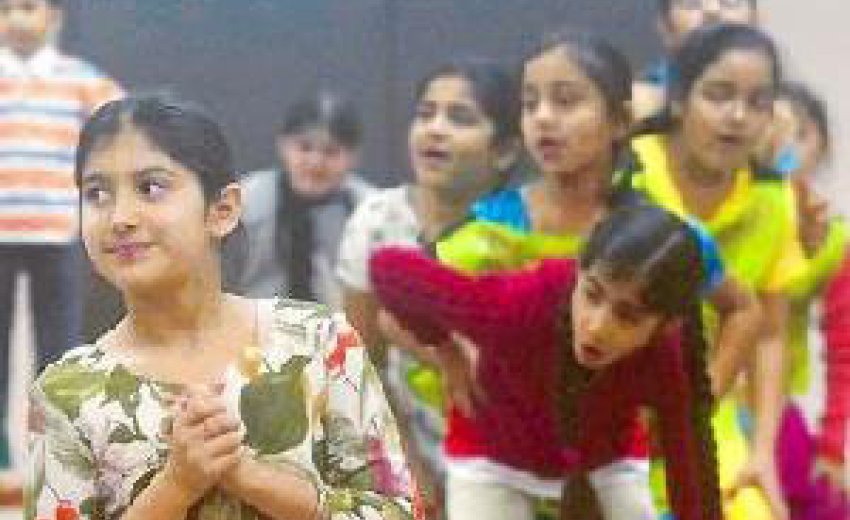
Like other Sikhs, Winston Churchill High School freshman Sehejneet Kaur doesn't cut her hair.
Though questions about her religion have died down since she first moved to Potomac as a fifth-grader, she still receives a few — and she isn't afraid to answer. "All Sikhs have long hair because our founder believed whatever God gives you, you should keep," Kaur, 14, explained. "You shouldn't cut your hair or change anything about yourself, because it's God-given."
Alongside keeping long hair, Sikh men wear turbans and Sikh boys wear head coverings known as patkas. But the Sikh faith runs much deeper than appearances, Kaur explained. Sikhs believe in one God, and follow the teachings of 10 spiritual teachers, or gurus, who lived from 1469 to 1708. Equality is a core belief of the faith. Many Sikh men and women carry the same last name — Singh for men, and Kaur for women — because when the religion was founded in India last names were tell-tale signs of which caste a person belonged, Kaur said.
This year, Sikhs are celebrating 300 years of their sacred scripture, the Guru Granth Sahib. The scripture, penned in 1708, is a collection of the teachings of all 10 spiritual teachers and preaches service to the community, social justice and understanding between faiths. Marking the milestone, Sikhs are celebrating and organizing community events to raise awareness about their culture for non-Sikhs locally and worldwide.
"Our intention is not to preach or proselytize," said Rajwant Singh, executive director of the Guru Gobind Singh Foundation, a North Potomac Gurdwara, or Sikh spiritual center. "But people have this mysterious view of who we are, and we want to take some of that mystery away."
While starting an interfaith dialogue can often pose challenges, members of the Travilah Road spiritual center have found a unique way of getting their message out — through musical theater. Sehejneet Kaur is one of the center's youth who is preparing for an upcoming performance at Thomas S. Wootton High School that will incorporate themes from the Sikh scriptures.
"The plays have to do with spreading the message of what we believe in," Kaur said. "It's also our way of sharing with people of other faiths and creating a bond of understanding between us and other communities."
Raising awareness is also an important way to combat misconceptions of Sikh culture, she said. "People think I'm Muslim sometimes just because of my skin color, and that's hard, because I'm not Muslim."
The Guru Gobind Singh Foundation recently formed the Rockville chapter of the Children's Theatre Company of New York in order to use drama as a way for the center's children to bridge barriers between faiths. The foundation formed the chapter after the center's youth participated last fall in a theatrical adaptation of Dr. Seuss' "The Lorax" through the Interfaith Conference of Metropolitan Washington, aimed to raise awareness about environmental degradation.
 "Our hope is that they are learning the art of performing and also as part of this process learning how to share the teachings of our Sikh scripture with the outside world," said Ravi Singh, a spiritual center member and coordinator of the performance.
"Our hope is that they are learning the art of performing and also as part of this process learning how to share the teachings of our Sikh scripture with the outside world," said Ravi Singh, a spiritual center member and coordinator of the performance.
Dec. 13, the children will stage musical adaptations of "Yertle and Myrtle the Tyrant Turtles" — inspired by Dr. Seuss, the tale of a turtle who struggles under a tyrannical king — and "The Wayward Knight," a story about a knight who forgoes his duty to the king in order to help a community member in need.
The plays will drive home important Sikh values such as standing up for social justice and being of service to those who need help.
However, organizers say the messages are universal. "They are about how religions, faiths and races need to live together," said Harminder Kaur, a spiritual center congregant who coordinated the play. "We all have to survive, and the best way is to be tolerant and sing to each other rather than snarl at each other."
According to Kaur, the Sikh concept of equality for all also means that all religions should be respected and revered. "We all speak the same language, but in different forms," Kaur said. "The beauty is in the differences…we need to make differences more beautiful, rather than letting them set us apart."
The performances of Yertle the Turtle and The Wayward Knight will take place from 4-6 p.m. Saturday, Dec. 13, at Thomas S. Wootton High School, 2100 Wootton Parkway, Rockville. Tickets are free, but donations will be accepted to benefit the Children's National Medical Center and the Interfaith Conference of Metropolitan Washington. To reserve tickets, email [email protected]

